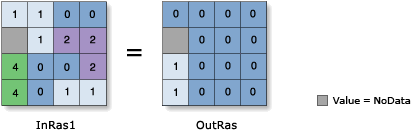| Operand | Explanation | Data Type |
in_raster_or_constant1 | The input being tested to determine if it is greater than the second input. If one of the inputs is a raster and the other is a scalar, an output raster is created with the evaluation being performed for each cell in the input raster. | Raster Layer | Constant |
in_raster_or_constant2 | The input against which the first input is tested to be greater than. If one of the inputs is a raster and the other is a scalar, an output raster is created with the evaluation being performed for each cell in the input raster. | Raster Layer | Constant |
Available with Spatial Analyst license.
Available with Image Analyst license.
Summary
Returns 1 for cells where the first raster is greater than the second raster and 0 for cells if it is not.
Illustration

Discussion
The relational greater-than operation evaluates the first input value in relation to the second input value on a cell-by-cell basis within the Analysis window. In the relational evaluation, if the condition is true (the first input value is greater than the second input value), the output is 1; if it is false, the output is 0.
Input1 > Input2, Output = 1
Input1 = Input2, Output = 0
Input1 < Input2, Output = 0When one or both input values are NoData, the output is NoData.
When using an operator with a raster input, the result will be a raster. However, if all inputs are numbers, the result is a number.
When multiple operators are used in an expression, they are not necessarily executed in left-to-right order. The operator with the highest precedence value will be executed first. For more information, see the operator precedence table in Work with operators in Map Algebra. You can use parentheses to control the execution order.
Boolean (~, &, ^, |) operators have a higher precedence level than Relational (<, <=, >, >=, ==, !=) operators. Therefore, when Boolean operators are used in the same expression as Relational operators, the Boolean operators will be executed first. To change the order of execution, use parentheses.
When multiple Relational and/or Boolean operators are used consecutively in a single expression, in some cases, it may fail to execute. To avoid this potential problem, use appropriate parentheses in the expression so that the execution order of the operators is explicitly defined. For more information, see complex statement rules section of Build complex statements.
Two inputs are necessary for the evaluation to take place.
The order of the input is relevant for this operator.
Output values are always integer.
If both inputs are single-band rasters, or one of the inputs is a constant, the output will be a single-band raster.
If both inputs are multiband rasters, the operator will perform the operation on each band from one input, and the output will be a multiband raster. The number of bands in each multiband input must be the same.
If one of the inputs is a multiband raster and the other input is a constant, the operator will perform the operation against the constant value for each band in the multiband input, and the output will be a multiband raster.
If both inputs are multidimensional rasters with same number of variables, the operator will perform the operation for all slices with same dimension value, and the output will be a multidimensional raster. The variables in the inputs must have same dimensions or common dimension but no uncommon dimensions.
If both inputs have one variable but different names, set the matchMultidimensionalVariable geoprocessing environment to False to perform the operation.
If one of the inputs is a multidimensional raster and the other input is a constant, the operator will perform the operation for all slices for all variables against the constant value, and the output will be a multidimensional raster.
Parameters
Code sample
This sample performs a Greater Than operation on two input rasters.
import arcpy
from arcpy import env
from arcpy.ia import *
env.workspace = "C:/iapyexamples/data"
outGreaterThan = Raster("degs") > Raster("negs")
outGreaterThan.save("C:/iapyexamples/output/outgt.img")This sample performs a Greater Than operation on two input rasters.
# Name: Op_GreaterThan_Ex_02.py
# Description: Performs a relational greater-than operation on two inputs
# on a cell-by-cell basis within the Analysis window
# Requirements: Image Analyst Extension
# Import system modules
import arcpy
from arcpy import env
from arcpy.ia import *
# Set environment settings
env.workspace = "C:/iapyexamples/data"
# Set local variables
inRaster1 = Raster("degs")
inRaster2 = Raster("negs")
# Execute GreaterThan
outGreaterThan = inRaster1 > inRaster2
# Save the output
outGreaterThan.save("C:/iapyexamples/output/outgt")